- Home
- Mark Pryor
The Crypt Thief
The Crypt Thief Read online
Full Title Page
Copyright
Published 2013 by Seventh Street Books, an imprint of Prometheus Books
The Crypt Thief: A Hugo Marston Novel. Copyright © 2013 by Mark Pryor. All rights reserved. No part of this publication may be reproduced, stored in a retrieval system, or transmitted in any form or by any means, digital, electronic, mechanical, photocopying, recording, or otherwise, or conveyed via the Internet or a website without prior written permission of the publisher, except in the case of brief quotations embodied in critical articles and reviews.
Cover image © 2012 Shutterstock.com
Cover design by Grace M. Conti-Zilsberger
Inquiries should be addressed to
Seventh Street Books
59 John Glenn Drive
Amherst, New York 14228–2119
VOICE: 716–691–0133
FAX: 716–691–0137
WWW.PROMETHEUSBOOKS.COM
17 16 15 14 13 5 4 3 2 1
Library of Congress Cataloging-in-Publication Data
Pryor, Mark, 1967–
The crypt thief : a Hugo Marston novel / by Mark Pryor.
p. cm.
ISBN 978-1-61614-785-3 (pbk.) • ISBN 978-1-61614-786-0 (ebook)
1. Americans—France—Paris—Fiction. 2. Murder—Investigation—Fiction. 3. Père-Lachaise (Cemetery : Paris, France)—Fiction. 4. Grave robbing—Fiction. I. Title.
PS3616.R976C79 2013
813'.6—dc23
2013001498
Printed in the United States of America
Dedication
For my mother and father, inspirations my whole life.
Author’s Note
As much as I love Paris, I have been forced to take occasional liberties with its history and geography. Events have been created and streets invented to suit my own selfish needs. All errors and misrepresentations, intentional and otherwise, are mine and mine alone.
Chapter One
The man stood still, scanning the night for movement. Seeing none, he stepped off the cobbled path and moved through a cluster of crypts, looking for a place to rest. He found four low tombs and swept a bouquet of flowers from the edge of one before sitting down. He listened for a moment then pulled a canvas bag onto his lap, reassured by the muffled clunk of the tools inside.
He rummaged in the bag and pulled out the map he’d drawn on his first visit to the cemetery, two weeks ago. Leaning forward, he pointed his headlamp at the ground before switching it on, holding the map in its yellow glow and running his eyes over the familiar lines and circles.
A breeze passed through the trees and he heard the rustle of leaves, like sighs of relief after a long, hot day. The gentle draft reached him and ruffled the page in his hand, caressed his cheek. He clicked off the lamp and looked up, savoring the coolness, and he shut his eyes for just a moment, tipping his head back so the sweat on his throat could dry.
Behind him, a scraping sound.
He looked over his shoulder at a pair of oak trees, blacker even than the moonless night, their limbs reaching out to each other like uncertain strangers, sightless branches jostling each other to touch the wind.
Taking a deep breath to relax himself, he turned his eyes to the concrete headstone at his back, suddenly curious about whose bones were beneath him. He switched his headlamp on and its light drew shadows out of the raised letters on a brass plaque. He mouthed the words James Douglas Morrison. Below the name it read, 1948–1971. A string of letters under the dates made no sense to him. Latin or Greek, perhaps.
He put the lamp and his map back into the bag and pulled out a water bottle, half empty from his long and dusty journey to this place. Two long swigs were all he allowed himself, and he put the bottle away.
He stiffened as voices drifted in from the path that he’d just left, conspiratorial whispers that wound between the stone and concrete tombs, soft words given form by the clarity of the night.
Two voices, a man and a woman.
In a moment his bag was open again, thick fingers gripping the butt of the gun he’d never used, a .22 Ruger he’d bought from a drunk outside a bar in Montmartre three months ago.
He slid the bag onto the ground and moved so he could see the path, his small feet stepping on the firm soil between patches of gravel, moving him silently between the stone slabs. As a boy, his mother had laughingly called him mon petit scarabée, my little scarab, for the way he could scuttle about the house without being seen, popping up where least expected to startle her, or, if he was there, to make his father turn red and growl.
The Scarab peered around a tall tombstone into the darkness and saw the couple coming toward him, arm in arm, heads close. They walked slowly, swaying as if they were drunk, holding each other up as their feet scuffed over the cobblestone path. They wore matching outfits: black T-shirts and camouflage pants tucked into military-style boots.
And they had no idea he was there.
He thought about letting them pass, he almost wanted to, but they made the decision for him by stopping ten yards away.
“His grave should be here,” the woman said. “You have the candle?”
They were speaking English, the man thought. He spoke English, too. Un petit peu.
“Yeah, sure.” The man slipped off a backpack. “Somewhere.”
“This is so exciting,” the woman said, her voice a stage whisper, breathless. She had olive skin and dark hair pulled back into a ponytail. Green eyes, the Scarab guessed.
He knew where they were going, where so many damn Americans went: to pay homage to a drug addict and alcoholic, a man who squandered his musical gifts and destroyed every piece of his talent with a needle. If they had the sense to recognize the power of the grave, he thought, they should have the sense to seek out those whose bones had something positive to offer.
He watched from the shadows as they stood at the edge of the path. His breath caught in his throat and he felt a stab of anxiety as he realized: They’ll see my bag.
He squeezed the grip of the pistol that hung by his side, as if reminding himself of its presence. He couldn’t risk them seeing his tools, raising the alarm.
He stepped out of the shadows and walked toward them, his gun parting the darkness in front of him. He trod carefully, quietly. He was the Scarab, scuttling out from between the stone tombs, unexpected and unseen until he was close enough to see their eyes widen and their mouths drop open.
He knew what they were seeing, too, and the fact that they looked at his face for so long before seeing the gun told him so. He’d seen that look when he didn’t have a gun in his hand, gotten it all his life. They were seeing a man barely five feet tall, the height of a child but with the stocky build of a professional, adult wrestler. They were seeing the face he’d gotten from his father, the long thick chin under wide cheek bones, and the narrow slits for eyes that sat deep, hidden, and unreadable. Eyes that were black holes bored into the base of an unusually high forehead, which itself ended with the spirals of copper wire that sprang across the crown of his head.
He watched them as they watched him and, when they’d taken all of him in, he decided that no words were necessary. He aimed at the man, pointing the gun toward his chest, squeezing the trigger softly like he’d practiced in his apartment. Now, though, instead of a click he heard a sharp crack. Once, then a second time after he’d brought the little gun under control, and in the dark night he heard the man fall onto the cobbles of the Avenue de la Chappelle. He looked over at the woman. She seemed to be hyperventilating, with one hand clamped over her mouth, as if quieting herself would circumvent the inevitable.
He was pleased so far. Such a small gun but so effective and easy to use.
He inched his aim to the left, cov
ering the woman, the girl, his finger firm on the trigger. It crossed his mind, for just a moment, that he could do more with her than he could with the man, exert control and make her . . . do things for him.
Their eyes met and held, but not for long enough to see whether he’d been right about their color. She was looking at his gun, her mouth working silently, and then her eyes flicked back to his face as her left arm rose from her side, stiff, and she put her hand out as if she were a policewoman stopping traffic. The Scarab stared at her palm for a moment, so white in the darkness, her fingers so delicate and frail, a desperate gesture from a girl who had nothing else to offer. A spiderweb to stop a train.
He pulled the trigger, again a gentle squeeze that wouldn’t mess up his aim. The crack seemed louder than before, more satisfying to the Scarab, and it sent a bullet through the middle of her palm and into her shoulder. Her hand flew up and then fell back to her side, and the girl let out a high-pitched whine as she took a step back, her head shaking in disbelief. The Scarab moved forward to see the expression on her face.
Surprise and confusion, he thought. But mostly fear.
She looked down at her hand, which released blood onto the path in a thick stream. Then she looked up, directly into his eyes, and opened her mouth wide.
The Scarab didn’t wait for her to scream. He shot her again, jerking the trigger three times, knowing he couldn’t miss from so close, and she crumpled to the ground without making another sound.
He knelt between their bodies, as much to listen for other intruders as to admire his work, and, as darkness and silence wrapped themselves around the cemetery once again, he ran his hands over the body of the girl. Her limbs were heavy, her throat was warm, and her lips dry. Her eyes weren’t eyes any more, just glassy beads, lifeless. Green beads. He tried to close her lids but they didn’t stay down, not all the way, so he left her like that, half asleep, half peeking up at a starless night.
He rose, went to his bag, and took out the charm. It won’t be going to the right person, tonight was no longer safe for him, but it could go to this girl. He wiped his prints from the figurine and, carefully, placed it on her chest.
He straightened and turned to the man. He kicked him in the head, just in case, and the body seemed to sigh. But when he kicked it again, it just rocked a little, silent.
An owl hooted close by and he looked at his watch, seeing the second hand ticking around too fast, realizing that his heart was ticking too quickly, also. He slowed it with twenty seconds of deep breathing, the wind stroking his brow like the gentle hand of his mother.
Which made him think of one more thing he should do.
Chapter Two
Hugo Marston ignored his phone, giving his attention instead to the waiter unloading a basket of croissants and a large café crème onto his table. He thanked the man and looked out the window at the stream of tourists heading across the Pont au Double toward the Cathedral of Notre Dame. Café Panis was not on his way to work but there was something about this spot that gave him energy, as if it were the hub of a wheel that set Paris spinning into life every morning. Not to mention all those people to watch, which for a former FBI profiler was like leaving a kid in front of the monkey cage at the zoo.
Hugo unwrapped a sugar cube and stirred it into his coffee before taking a tentative sip. He checked his phone—technically he was on the clock—and was surprised to see that it was his friend Tom Green who’d called. He dialed him back.
“You’re up early,” Hugo said. “What time did you get in last night?”
“None of your business.”
“Ah, CIA business.”
“Like I’d tell you if it was. What are you doing?”
“Breakfast at Panis. Join me.”
“Not right now. You headed to the embassy in a bit?”
“Possible,” said Hugo. “It being Monday and that being where I work, I probably should.”
“You’re the chief of fucking security, you can show up whenever you want.”
“I’ll be sure and remind the ambassador about that rule.”
“Do what you like,” Tom said, “but have Emma make the coffee this morning, will you?”
“So you are coming in.”
“Sherlock Holmes. But gimme an hour. I got some yuck to scrape off my body.”
“Jeez, Tom, not again. What was her name?”
“When you pay,” Tom said patiently, “you don’t have to ask.”
“And when you ask nicely, you don’t have to pay.”
“Thanks but I don’t take romantic advice from a virgin, Hugo. See you at your office.”
Tom hung up, as usual, without a good-bye. He’d been Hugo’s roommate and best friend at the FBI’s training grounds in Quantico almost twenty years ago, a friendship that deepened during a shared tour at the bureau’s LA field office after graduation. Then their career paths took them in different directions: Hugo’s higher up the ladder at the Behavioral Analysis Unit as a profiler, Tom’s into the CIA as . . . Hugo never really found out what and suspected he didn’t want to know. But whatever Tom was up to put several years between them, and Hugo had missed his foul-mouthed intellectual of a friend.
Then Tom arrived in Paris, moving into Hugo’s spare room months ago, overweight, too in love with whisky for Hugo’s liking, and claiming to be retired but still “consulting” for the CIA. As far as Hugo could tell, that meant coming and going at random hours, disappearing for a week or more without warning, and sometimes sleeping for days at a time. Of course, the last one might just have been the booze.
Hugo sipped his coffee, wondering if Tom was on another job. Why else would he come to the embassy? Or be up before noon.
He turned as the news came onto the television behind him. A scrolling banner flickered along the bottom of the screen and Hugo sat up straight as the newsreader told of two tourists found dead at the famous Père Lachaise cemetery. No names, no nationalities, no suspect.
But the victims were tourists, which meant there was a decent chance they were Americans, and if so the ambassador would want all hands on deck, including his chief regional security officer.
Hugo swallowed the rest of his coffee and dropped twelve euros on the dish beside his bill. He grabbed a second croissant and stepped out of the café onto Quai de Montebello, humming with the traffic and pedestrians heading to wherever they belonged on a Monday morning.
He crossed the street at a stoplight and headed west alongside the Seine, nodding bonjours to the bouquinistes who were setting up their riverside book stalls for the day. As he did so, his mind inevitably conjured up images of his friend Max, the gruff and grumpy bouquiniste who’d sold Hugo every worthwhile book the American owned, always pretending to steal from Hugo while in reality giving him each book for a song. Hugo looked down at the Seine as he walked and watched the barges chug slowly along its edges, leaving the heart of the river for the glass-paneled bateaux mouches, the tourist boats that promised fine views of both sides of the bank, rain or shine. They were like servants, these barges, sliding to one side, making way for their glamorous masters who bore cargo more precious, more immediately lucrative, than coal, cloth, and wine.
Behind Hugo, the summer sun had crested Paris’s highest buildings and warmed the back of his neck, and he welcomed the cool morning breeze that drifted up from the river to accompany him on his walk.
He stayed on the Left Bank until he reached the Pont Royal, which took him over the river to the grounds of the Louvre Museum. It was a frequent walk for him, this morning stroll through the garden of the Tuileries, because it was the one time of the day that he’d see more birds than people, especially in the summer. From here it was less than a mile to his office, and as the trees and grass breathed for the city, this space breathed for him, too. His usually purposeful stride slowed to a genteel stroll as if a lasting decree from Napoleon himself forbade haste across this hallowed soil.
Emma looked up as Hugo walked into the ground floor offices of t
he security section of the US Embassy. She was, as ever, gently but perfectly coiffed, wearing an elegant silk blouse that complimented her graying hair, a matching string of pearls around her neck.
“Bonjour, Hugo,” she said. “Don’t bother with your office, the ambassador wants to see you.”
“So early?”
“It’s almost ten.”
“I’m on French time.”
“Well, in that case it’s almost ten. Now get going.”
Hugo winked and started back the way he’d come, taking the stairs up to the third floor where the ambassador had his rooms, including his office. His secretary, tucked behind a petite white desk, waved him in.
Ambassador J. Bradford Taylor was standing by the empty fireplace when Hugo walked in. He turned and smiled, and Hugo thought he saw a measure of relief in his face.
In temperament they were very much alike and so had transcended the master-servant relationship, something Hugo had never been good at in either role, and become friends over the two years Hugo had been stationed in Paris. Physically, however, they could not have been more different. At five feet, eight inches, the ambassador had surrendered his physique to the party circuit and acquired a potbelly that, in recent months, he’d started to caress when deep in thought. Hugo, on the other hand, stood a good six inches taller and merely nibbled at the foie gras. As a result, despite his forty-three years, Hugo’s shoulders remained markedly wider than his waist. And, where the ambassador was bald, Hugo’s dark-brown hair had done nothing worse than gray a little. In fact, at a dinner at Le Procope a few months back, Taylor had jokingly announced their arrival to some American businessmen by saying, “Fatty Arbuckle and Cary Grant are here,” prompting Hugo to remind his boss that he was still the ambassador and was entitled to a little extra weight. And respect.
“Sit down, Hugo.” Taylor pointed him to the cluster of chairs to Hugo’s left. “I believe you know my guest.”

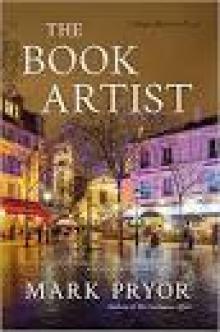 The Book Artist
The Book Artist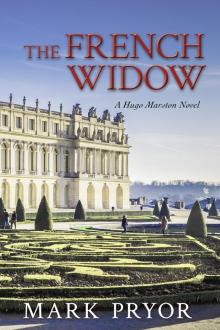 The French Widow
The French Widow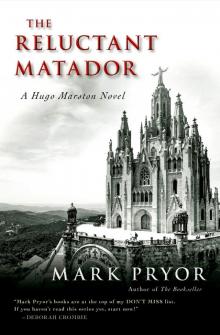 Hugo Marston 04 - The Reluctant Matador
Hugo Marston 04 - The Reluctant Matador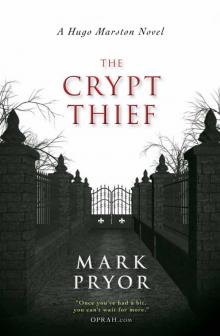 The Crypt Thief
The Crypt Thief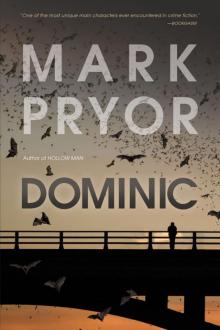 Dominic
Dominic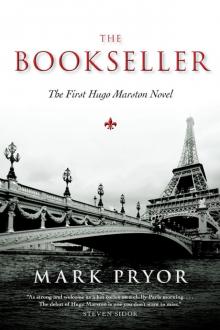 The Bookseller
The Bookseller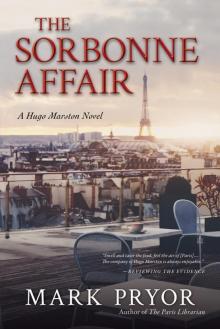 The Sorbonne Affair
The Sorbonne Affair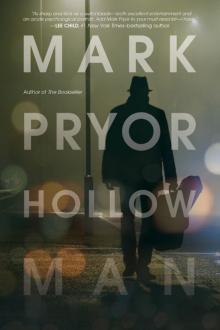 Hollow Man
Hollow Man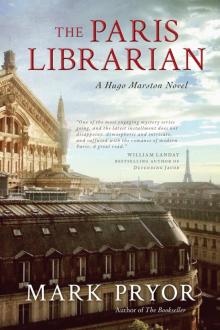 The Paris Librarian
The Paris Librarian